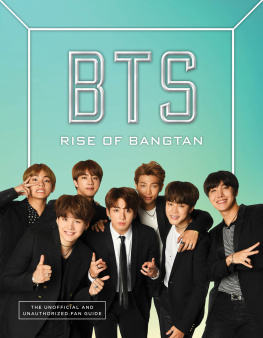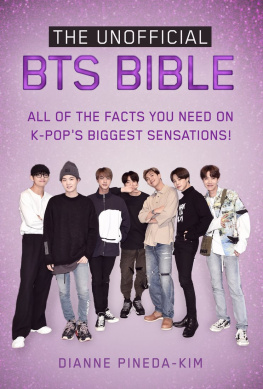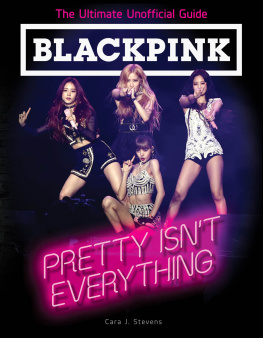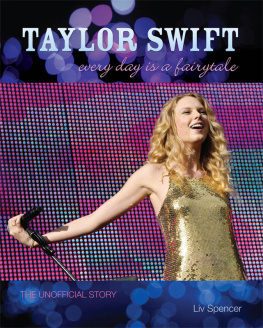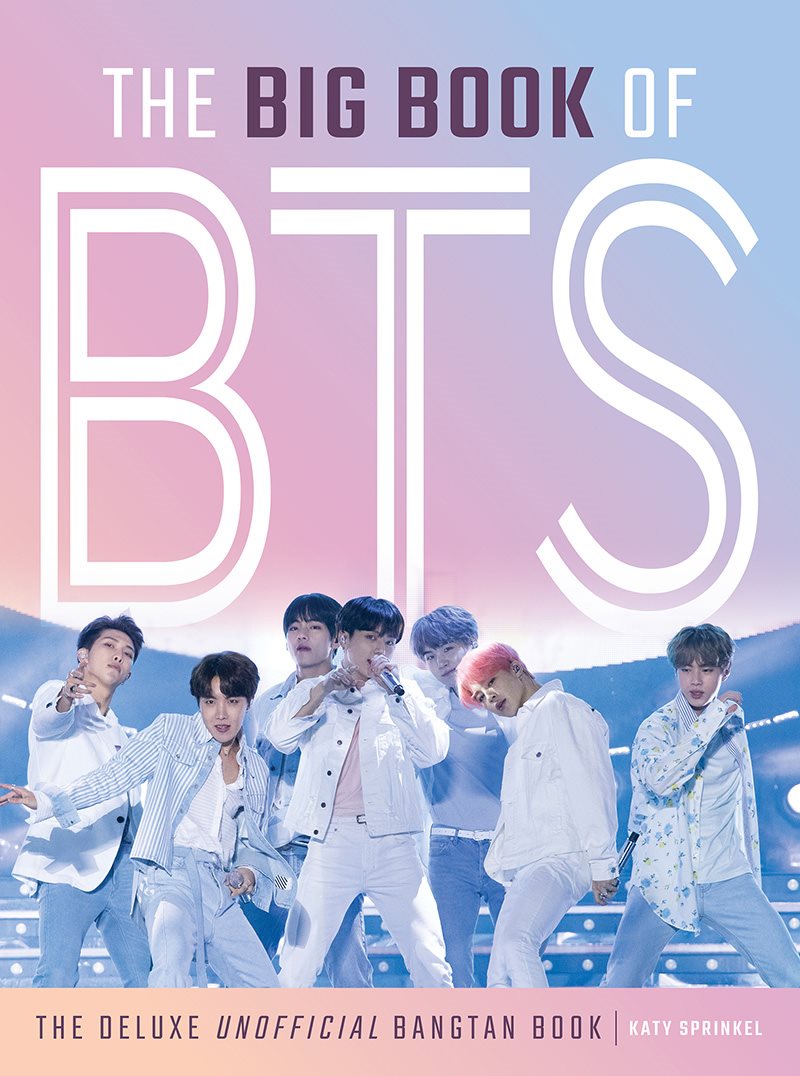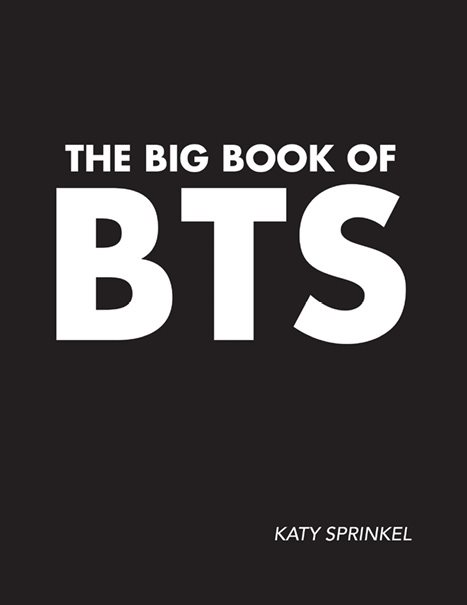
Contents
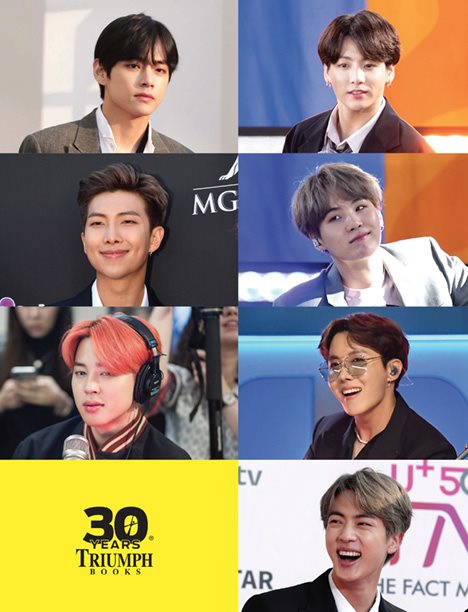
1. No False Idols
If you havent heard of BTS, maybe youve been asleep for the last few yearsor hiding under a rockor without a reliable Internet connection. If any of those scenarios apply to you, then consider this a formal introduction. The seven-member band known alternately as BTS or the Bangtan Boys is nothing short of a global phenomenon. And after years of making noise in their native South Korea, Japan, and beyond, the group is finally poised to make their biggest leap yet into the American mainstream.
They have had seven songs chart on the Billboard Hot 100 singles list (two of them in the top 10), have debuted three consecutive albums at No. 1 on the Billboard 200 albums chart, and have held the top spot on Billboards Social 50 chart for all but nine weeks in the past three years. Theyve graced the cover of Billboard magazine (actually, seven of themone cover for each of BTSs seven members), Entertainment Weekly , Rolling Stone , and even Time . In June 2018 they became the first group who doesnt record primarily in English to hit No. 1 on Billboards Top 100 Artists chart as the top-selling artist in the U.S. Whats more, they have a devoted legion of fans who earned them the Top Social Artist award at the Billboard Music Awards for three years running, besting the likes of Justin Bieber, Ariana Grande, Selena Gomez, and Shawn Mendes. And yet despite all that, theyre still not yet a household name.
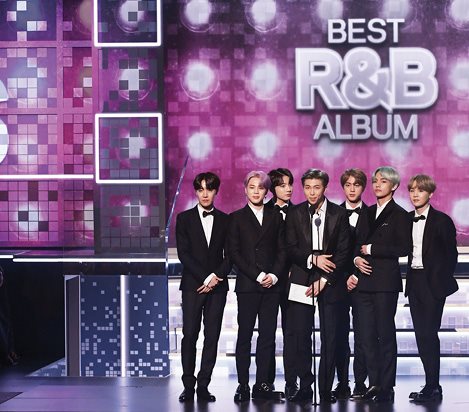
BTS presents the award for Best R&B Album at the 2019 Grammy Awards ceremony. Thank you to all our fans for making this dream come true, and well be back, promised RM.
While chart performance and media recognition are all fine and good, they dont tell anywhere near the full story of BTS. Having already broken the mold in the hugely successful genre of K-pop, BTS is the first legitimate crossover success in the States. Why? Their unique brand of socially conscious pop/hip-hop music, slick choreography, and unprecedented fan engagement has set them apart from the rest of their contemporaries. Their self-dubbed ARMY of fans is a force to be reckoned with.
Formed in 2013, BTS (aka the Bangtan Boys, Bangtan Sonyeondan, the Bulletproof Boy Scouts, and the more recent moniker Beyond the Scene) is a seven-man group consisting of rappers RM, Suga, and J-Hope and vocalists Jin, V, Jimin, and Jungkook. Together, the multitalented Bangtan Boys have seamlessly blended their skills to create a unique K-pop group. Focusing on issues beyond the typical dance-pop offerings, BTS struck an immediate chord with fans.
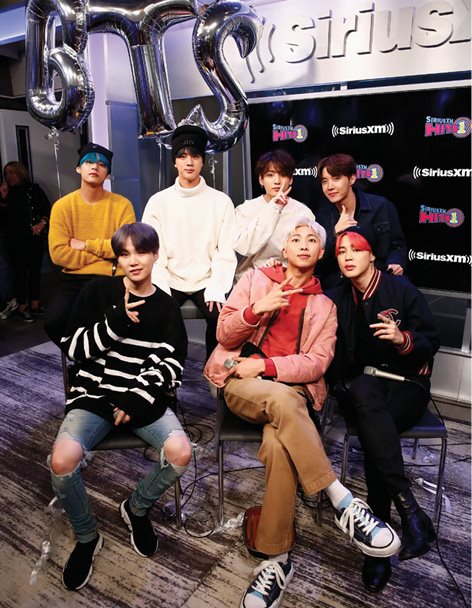
Looking fly during a visit to SiriusXM in New York in 2019.
Lets get one thing straight first: BTS is no fly-by-night operation. They are nothing less than international superstars. Since making their debut in 2013, theyve been absolutely killing it in their native South Koreatheyre the best-selling musical group in the country and have won South Koreas top artist prize for the last three years running. (Theyve also hit No. 1 in 73 other countries, thank you very much.)
Theyve won seemingly every award in South Korea, and have nabbed Billboard Music Awards, American Music Awards, and dozens of other awards in the U.S. and internationally. They even snagged their first Grammy nomination in 2019.
Theyre the most sought-after pitchmen in South Koreathe face of several brands, including Puma, Hyundai, LG Electronics, and even Coca-Cola, for which they represented South Korea at the 2018 World Cup, perhaps the worlds biggest advertising stage.
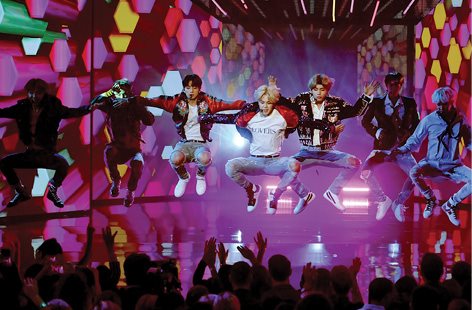
BTS burns up the stage at the 2017 American Music Awards.
More important, theyre fearless activists and agents of change ( Rolling Stone called them K-pops biggest taboo breakers), whose music fearlessly tackles an array of social issues. Theyre global ambassadors for UNICEF and have even addressed the United Nations General Assembly.
BTS mania is so widespread that its been compared to the likes of Beatlemania. ( The Late Show with Stephen Colbert even paid homage to the Fab Four when BTS recently performed in Colbert s Ed Sullivan Theater dressed in slim-cut black suits like the Beatles wore on their American TV debut 55 years earlier on the very same stage.) The band is riding an unprecedented wave of success around the world, and that wave is just now crashing on American shores. So if you arent already certified ARMY, get prepared to become a new recruit!
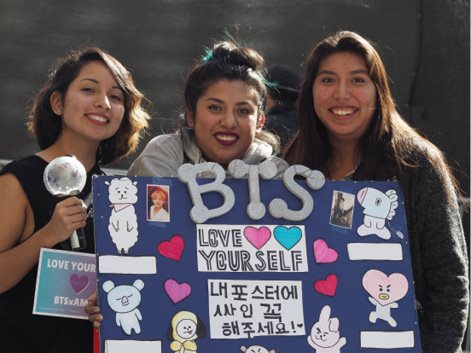
American fans often arrive at shows with messages written in Korean.
2. Hallyu 101
To best appreciate what BTS has achieved, a little context might be helpful. So first, a little history. To the outside observer, K-pop looks like a sugarcoated confection, a frenetic collection of beats, catchy hooks, super-sharp dancing, and kaleidoscopic visuals performed by impossibly attractive singers and entertainers. But to dismiss it as a cotton-candy version of pop music would be way off the mark. Not only is K-pop wide-ranging in its musical styles and onstage product, its serious business. Big business.
In fact, it is nearly impossible to overestimate the power of K-pop. The multibillion-dollar industry (thats right, billion with a B ) is one of South Koreas biggest exports, and a huge contributor to the countrys bottom line. Those eye-popping numbers are pretty impressive for a country with a population of only 51 million. (Compare that to the U.S.s 326 million people.) In fact, South Korea is the worlds eighth-largest market for recorded music by revenue, according to the International Federation of the Phonographic Industry, Bloomberg reports. Whats more, thats bigger than India (whose own entertainment industry is well-known worldwide) and even China. (And for those of you doing the math, India and China are the two most populous countries in the world, with more than 1.3 billion citizens apiece.)
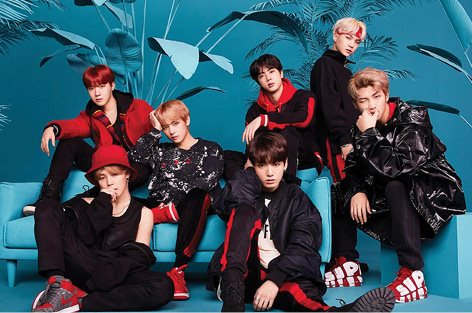
Fire! BTS in 2018.
So how did Korean culture become so pervasive? Lets rewind to the mid-20 th century. In the aftermath of the Korean War, the countrys ruler, President Park Chung-hee, supported strict cultural conservatism. (This included such standards as enforcing short haircuts on men and modest hemlines on womens clothing.) Additionally, the government controlled the media, so all radio and television programming was under its purview. The end result in music was an especially bland mixture of inoffensive, by-the-numbers pop music alongside traditional Korean music, known as trot (short for foxtrot ).
When South Korea became the so-called Sixth Republic in 1987, becoming a liberal democracy, things started to relax a little bit. One of the most popular television formats in South Korea at that time (and still today) was the musical competition show. Forebears to Western programs such as American Idol and The X Factor , Koreas weekly music showssuch as Inkigayo and Music Bank were nothing less than appointment television. (And in a country where 99 percent of homes had a TV by the late 1980s, thats saying something.) Audiences were hugely invested in the outcomes.


